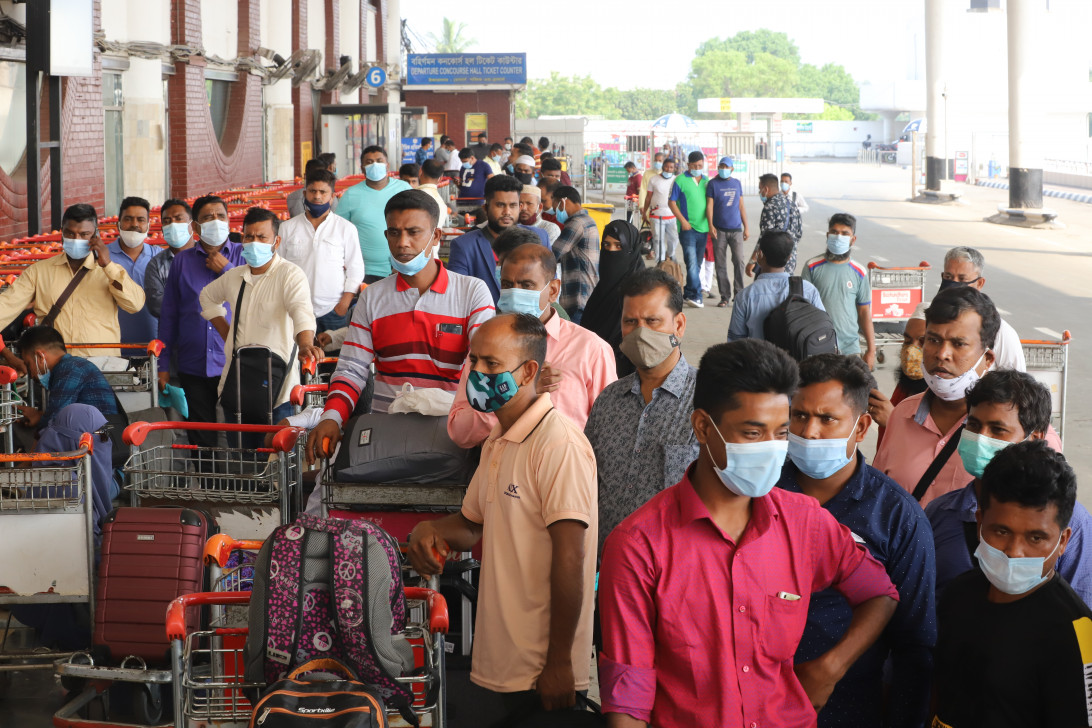Amending MoU on Malaysia-bound Bangladeshi workers can bring a sea change

The Malaysian prime minister is due to arrive in Dhaka today on an official visit. This is significant for two reasons: this is the first visit by a Malaysian premier to Bangladesh in nearly 11 years, and it will also be the first visit of a head of government during the tenure of the interim administration.
The foreign ministry informs that, among other issues of mutual interest, the bilateral discussions will focus on economic, political, trade and investment, and labour migration. The source emphasises that both countries want facilitation of labour migration through a transparent method.
Bangladeshi workers, particularly those in the low-skilled category, are making major contributions in the construction, manufacturing, plantation and services sectors in Malaysia. Through their hard work, they have earned the confidence of their employers in Malaysia who are keen to recruit more from Bangladesh. The Malaysian market, however, remains closed since May 31 this year.
The less fortunate segment of Bangladeshi workers in Malaysia, many of whom migrated after the so-called syndicate arrangement, have to pay inordinately high migration costs. These workers are charged far above the government-set cost of around Tk 79,000 (about 2,940 ringgit), with the average cost being Tk 5.44 lakh (about 20,300 ringgit) to secure employment in Malaysia. This steep increase in the cost of migration from Bangladesh is directly linked to the destination country enjoying the prerogative of fixing the number of recruiting agencies in the source country that were allowed to send workers. After the flow of workers to Malaysia resumed in July 2022, only 25 of the 1,520 registered recruiting agencies in Bangladesh were granted the permission. Subsequently the number was increased to 100. As no criterion was set for the selection of recruiting agencies, many with fresh licence (allegedly granted under political and other considerations) became beneficiaries of this arrangement.
The new prime minister's resolve to overhaul the country's migrant worker recruitment system, particularly pertaining to a lucrative source country like Bangladesh, has come under strong resistance from industry high-ups, public functionaries, and a section of Malaysian political elite. Attempts to replace Bestinet's hold over the proprietary IT system have thus far been successfully thwarted.
After the fall of the Awami League government in August this year, Bangladesh's anti-graft agency began an investigation into the alleged syndicate led by several former parliamentarians of the erstwhile ruling party. They were accused of embezzling Tk 24,000 crore (8.9 billion ringgit) under the pretext of sending workers to Malaysia. Allegations are rife that the syndicate is led by a Dato of Bangladeshi origin in Malaysia and operated with the support of senior officials in both Bangladesh and Malaysian governments. A Verité-led consortium study reveals 96 percent of Bangladeshi workers going to Malaysia face high recruitment debt and exploitation.
The syndicate system has been a contentious issue in Malaysian politics. In June 2022, the then opposition leader Anwar Ibrahim demanded a full investigation of two companies, including Bestinet, following allegations of their involvement in a visa scheme and supplying of foreign workers. He raised doubts about the government's ability to manage misappropriation and malpractice. He referred to it "as modern slavery, where workers are blackmailed while traders and agencies act as oppressors who reap huge profits." In April 2023, Democratic Action Party leader Charles Santiago called on the government for "dismantling Bestinet and eliminating labour brokers." He demanded an "open and transparent recruitment process in both countries." After Anwar Ibrahim's assumption of power following the November 2022 general election, the human resource ministry came under scrutiny and five officials were sacked.
The new prime minister's resolve to overhaul the country's migrant worker recruitment system, particularly pertaining to a lucrative source country like Bangladesh, has come under strong resistance from industry high-ups, public functionaries, and a section of Malaysian political elite. Attempts to replace Bestinet's hold over the proprietary IT system have thus far been successfully thwarted.
Both Bangladesh and Malaysia should strive to find ways to dismantle the syndicate arrangement. A possible way out lies in the amendment of a section of the memorandum of understanding (MoU) on employment of workers signed by the countries. Section C (v) of the MoU sanctions that "the Government of Malaysia shall select BRAs (Bangladesh Recruiting Agencies) … from the list provided by the Government of Bangladesh." Machinations of vested quarters with access to corridors of power both in Putrajaya and Dhaka led to insertion of such a provision in the MoU. It is only in Bangladesh's case that such a provision has been incorporated. None of the 14 other source countries has to endure such stipulation.
By amending this provision, if the responsibility of selecting the BRAs are shifted from the Malaysian government to the Malaysian employers (as is the case with the other source countries), the latter would be at liberty to choose their supplier companies, while all BRAs will enjoy fair competition to access the Malaysian labour market. Such an arrangement will generate fair competition, significantly lower the cost of migration, and create a situation in which Bangladeshi migrant workers will be able to enjoy the fruits of their hard labour.
We take this opportunity to urge the chief adviser to raise the issue of amending one word in the MoU that will bring a sea change for our migrant workers.
Dr C R Abrar is an academic with interest in human rights. He is the executive director of the Refugee and Migratory Movement Research Unit (RMMRU).
Views expressed in this article are the author's own.
Follow The Daily Star Opinion on Facebook for the latest opinions, commentaries and analyses by experts and professionals. To contribute your article or letter to The Daily Star Opinion, see our guidelines for submission.




 For all latest news, follow The Daily Star's Google News channel.
For all latest news, follow The Daily Star's Google News channel. 

Comments